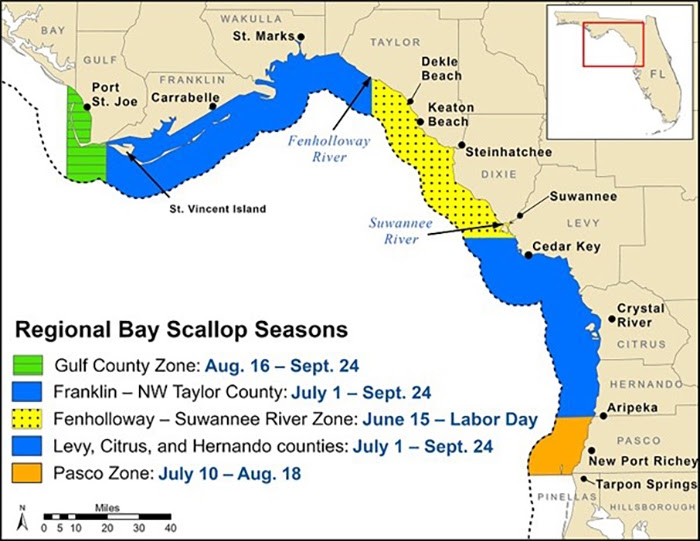Bay scallop season opens July 1 in Franklin - NW Taylor, Levy, Citrus, and Hernando counties
Florida Fish and Wildlife Conservation Commission (FWC)
The 2024 recreational bay scallop season in certain Bay Scallop Regions of Florida will open on Monday, July 1, 2024 and remain open through Tuesday, September 24. 2024.
Areas to open to bay scallop season (see map) include Franklin County through northwestern Taylor County, which includes Carrabelle, Lanark and St. Marks; portions of Levy County, all of Citrus County, which includes Cedar Key, Crystal River and Homosassa; and all of Hernando County.
The daily bag limit in these areas is 2 gallons of whole bay scallops in the shell or 1 pint of bay scallop meat per person, with a maximum of 10 gallons of whole bay scallops in the shell or 1/2 gallon (4 pints) of shucked bay scallop meat per vessel.
Throughout the season, vessel limits do not allow an individual to exceed their personal bag limit.
Although bay scallop season dates may vary by region, regulations do allow the direct and continuous transit of legally harvested bay scallops through closed areas. When transiting, boaters may not stop their vessels in waters that are closed to harvest; instead, they must proceed directly to the dock or ramp to land scallops in a closed area.
Recreational harvesters need a Florida saltwater fishing license to harvest bay scallops, unless they are exempt from needing a license or have a no-cost shoreline fishing license and are wading from shore to collect scallops - that is, their feet do not leave the bottom to swim, snorkel, or SCUBA, and harvesters do not use a vessel to reach or return from the harvest location.
To purchase a Saltwater Fishing License, visit GoOutdoorsFlorida.com, call toll-free 888-FISH-FLORIDA (888-347-4356, or purchase through the Fish|Hunt FL app on Apple and Android devices. Links to download the Fish/Hunt FL app at both the App Store and Google Play can be found at this link: license.gooutdoorsflorida.com/Licensing/CustomerLookup.aspx.
For more information on current recreational bay scallop regulations, visit MyFWC.com/Scallops.
Boater and scalloper safety
The Florida Fish and Wildlife Conservation Commission (FWC) reminds boaters to designate an operator who will remain sober to ensure the safety of everyone with them and around them. Operating a vessel while under the influence of alcohol or drugs is illegal on all bodies of water and can lead to series injuries and consequences.
A vessel operator suspected of boating under the influence must submit to sobriety tests and a physical or chemical test to determine blood- or breath-alcohol content. In Florida, a vessel operator is presumed to be under the influence if their blood- or breath alcohol level is at or above 0.08, the same as in a motor vehicle. Any person under 21 years of age who is found to have a breath alcohol level of 0.02 or higher and operates or is in actual physical control of a vessel is in violation of Florida law
Learn more about Boating Regulations at this link: myfwc.com/boating/regulations.
Seagrass awareness
It is a violation of Florida law to damage seagrass beds in some areas within state waters. Boaters should stay within the marked navigation channels whenever possible and avoid motoring through seagrass beds in shallow water, which can cause propeller scars. Seagrasses are the principal food for endangered marine animals such as manatees and green sea turtles, act as natural filters to help purify the water, and serve as important habitat for a wide variety of marine life, like the bay scallop.
Boaters should make all available attempts to avoid running through seagrass beds. Navigation charts identify seagrass beds as light green or marked as "grs" on the chart. Boaters should make all possible attempts to stay within channels when unfamiliar with a waterway and avoid taking shortcuts through seagrass beds to avoid causing propeller scars.
Scallop shells and trash - Stow it, don’t throw it
Please do not discard scallop shells in inshore waters commonly used for recreational activities, such as near boat ramps or swimming areas. Piles of discarded scallop shells can create hazards for swimmers and damage seagrass habitat. Scallop shells can be discarded in a trash receptacle or in larger bodies of water where they are more likely to disperse. Also, don’t forget to stow your trash securely on your vessel so that it doesn’t blow overboard.
Panhandle scallop sitters
Scallop Sitters are volunteers who maintain cages from private docks with up to 50 bay scallops from June through January in St George Sound, St Joseph Bay and St. Andrews Bay in the Panhandle area of Florida. On a monthly basis, these volunteers check, count and clean their cages and scallops. Each volunteer will receive one cage, one bucket of scallops, tools to maintain cages, instructional materials and giveaways.
For information about becoming a scallop sitter, visit myfwc.com/research/saltwater/mollusc/bay-scallops/sign-up.
